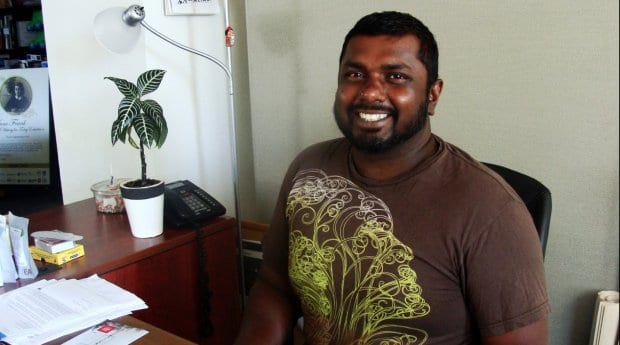Not many people can say they’ve been a grand marshal of Vancouver’s Pride parade twice.
But on August 2, 2015 Romi Chandra Herbert will once again help lead the Vancouver Pride parade, 17 years after he was first recognized for creating BC’s first gay-straight alliance (GSA).
“Back then, it was a really interesting time period for starting something up and being rewarded for that,” he says. “I never knew that I could be honoured in that way, so that was really beautiful.
“Then to have this honour back made me feel like maybe I am on the right path, that I haven’t stopped doing something that I’m really passionate about.”
Chandra Herbert has been making space for queer youth since he founded that first GSA in Maple Ridge in 1997. Today, he continues to make space and support skills development for youth and marginalized communities throughout BC. Not only does he personally host anti-homophobia workshops in schools and communities, he has also penned manuals for youth who are interested in starting their own clubs and organizations.
In response to the growing agency of youth, his most recent guide teaches them how to interact with politicians and create change through policy.
“They want to be engaged. Now, as an adult, I look back on myself as a young person and I had so much I wanted to do and I was fortunate enough to have adults in my life that allowed me to flourish that way,” he says.
“A lot of the time I think young people are given the short end of the stick because more and more I am seeing programs that are directed to them but never that give them the opportunity to grow as a person. I’d love to see more of that happening — that mentorship that I feel I got as a student.”
Chandra Herbert finds it most rewarding when he sees youth he’s worked with step forward themselves as leaders. To him, a community’s strength lies partly in its self-sufficiency.
Even as the queer community grows stronger, challenges remain.
“My racial identity when I was working in queer community groups wasn’t as talked about, and I felt that that part of my identity — I wasn’t losing it, but not putting as much effort into it,” says Chandra Herbert, whose parents moved his family to Canada from Fiji in 1989.
“Often in the queer community I ended up being the only person of colour, and to this day I find it challenging,” he says. “At that point I really became frustrated, from queer images that were not representative of the whole community to work places that weren’t representative.”
He has worked with the North Shore Multicultural Society to create an anti-racism program, and today uses his position as co-director at PeerNet to create programs that enforce an intersectional, inclusive approach to activism.
For Chandra Herbert, Pride has always been an opportunity to bring more facets of our community together and to raise awareness about the many challenges we still face.
“While I understand that many people use it as a celebration, for me it’s more about looking at the history of this event and why it was started,” he said. “We can change it all — we want to reflect the celebratory nature of things but we still, in my heart, haven’t gained the full equality of things that our community is deserving of. And until that happens it’ll always be an opportunity for me to voice my issues with what communities can do to build better queer communities.”
This profile is the second in a three-part series on Vancouver Pride’s 2015 grand marshals. Read our first profile on Roan Reimer here, and our third profile on Michelle Fortin here.
The Vancouver Pride parade will take place on Sunday, Aug 2, 2015 from noon to 3pm. For more information go to vancouverpride.ca

 Why you can trust Xtra
Why you can trust Xtra


